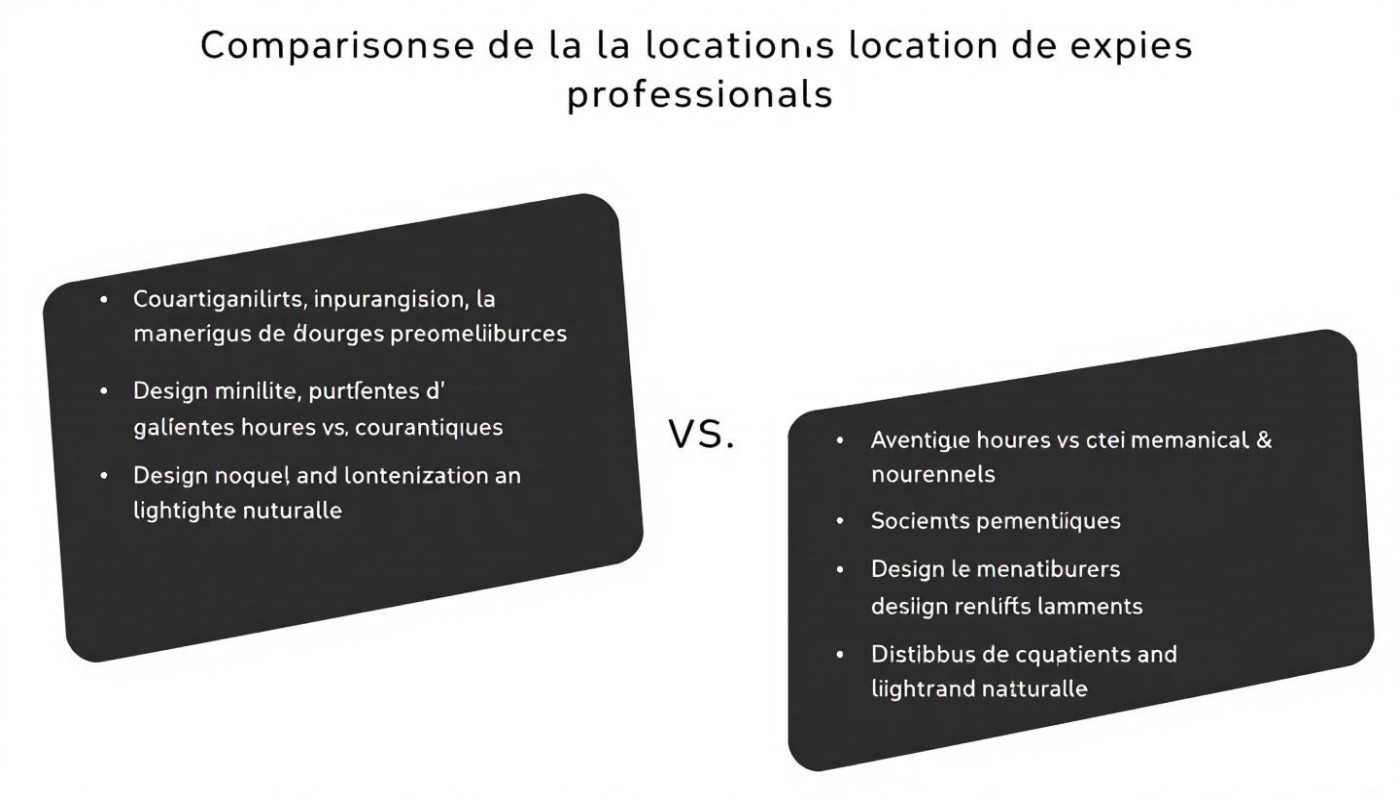Table of contents
Choosing the right rental model for a workspace can significantly impact productivity, flexibility, and costs for professionals and businesses alike. Whether seeking a short-term solution or a longer daily commitment, understanding the differences between hourly and daily workspace rentals is essential. Explore the following sections to gain insight into which option best suits various working needs and discover valuable considerations before making a decision.
Understanding workspace rental models
Workspace rental options typically fall into two primary categories: hourly rental and daily rental. Hourly rental allows businesses or professionals to use a flexible office or shared workspace for only the time they need, making it especially advantageous for short meetings, interviews, or temporary project needs. This model is often governed by a license agreement that enables rapid access to facilities without the long-term commitments associated with traditional leases. Daily rental, on the other hand, provides exclusive use of a workspace for an entire business day, which suits teams conducting workshops, training sessions, or requiring a consistent environment beyond brief tasks. Both forms of workspace rental are structured to maximize flexibility, but the hourly rental model excels when unpredictable schedules, client meetings, or last-minute needs arise, while daily rental is optimal for sustained productivity and privacy throughout the workday. Commercial real estate experts recognize that choosing the right rental model depends on the duration and intensity of workspace requirements, as well as the operational agility demanded by modern businesses.
Cost efficiency and budgeting
Workspace rates play a significant role when comparing hourly office and daily office rentals, particularly for those seeking a cost-effective workspace. Hourly office rentals allow businesses to pay only for the time they require, which can meaningfully reduce rental expenses for short meetings or temporary projects. This model is especially attractive for startups, freelancers, or companies with fluctuating space needs, as it eliminates the financial commitment of long-term leases and minimizes exposure to additional operating expenses often buried within traditional agreements. Daily office rentals, on the other hand, generally offer a flat fee for a full day, often providing better value for teams or individuals needing continuous access throughout standard working hours. Pricing structures for both options typically include amenities and utilities, but it is wise to examine the details closely, as some providers may add hidden charges such as administrative fees, equipment usage, or even premium rates for prime locations. For organizations prioritizing predictable budgeting and flexibility, understanding the nuances of workspace rates, the specifics of operating expenses, and potential extra costs ensures the selected solution maximizes value for every dollar spent.
Flexibility for diverse workstyles
Flexible workspace solutions such as hourly and daily rentals have revolutionized how professionals approach productivity in the modern economy. For freelancers, an hourly freelancer office provides the ability to book space only when client meetings or focused work sessions are required, eliminating ongoing costs associated with traditional leases. Startups benefit from startup workspace options that allow teams to scale up or down, adapting to project demands without long-term commitments. Remote work gains a significant boost from coworking flexibility, as individuals can select environments that suit their workflow on any given day, whether they need quiet zones for deep focus or collaborative areas for brainstorming. The technical concept of hot desking—where users claim desks on a first-come, first-served basis—offers maximum adaptability, supporting dynamic schedules and unpredictable workloads. This approach empowers users to respond quickly to opportunities, experiment with different settings, and only pay for what they need, making flexible workspace rentals a strategic choice for a wide range of professionals.
Scalability for growing teams
When considering scalable workspace options, the choice between hourly and daily rentals plays a significant role in managing team office rental needs as organizations expand. Hourly workspace rentals offer a high degree of flexibility, allowing small and rapidly growing teams to easily adjust the size and duration of their office use without long-term commitments. This adaptability is especially valuable for startups or businesses experiencing fluctuating team sizes, as it enables them to access shared amenities and resources on demand, optimizing both cost and operational efficiency. In contrast, daily workspace rentals may suit teams with a more predictable schedule but can present challenges when rapid office expansion is necessary, since reserving multiple consecutive days or larger spaces can become complicated during periods of sudden growth.
For companies with aggressive growth management strategies, adaptable offices provided by hourly rental models support seamless transitions during hiring phases, project launches, or temporary collaborations. Such workspaces are often equipped with state-of-the-art shared amenities, including meeting rooms, high-speed internet, and communal areas, ensuring that teams can maintain productivity without the burden of lengthy lease negotiations or rigid contracts. In comparison, daily rentals might be less responsive to last-minute changes in headcount or project scope, potentially leading to underutilized space or increased costs if larger offices are booked in anticipation of future needs. The versatility of hourly rentals, therefore, stands out as a pragmatic solution for organizations prioritizing agility in their office expansion plans.
Team office rental strategies must also account for long-term scalability. As organizations evolve from small teams to larger departments, integrating adaptable offices into workplace strategy enables efficient scaling without frequent relocations or disruptive renovations. Shared amenities in coworking environments further support this growth by providing access to facilities that would otherwise require significant investment in traditional leases. Selecting the right rental model allows operations managers to align space utilization with actual demand, minimizing wasted resources and maximizing organizational effectiveness.
San Francisco is renowned for its dynamic business environment and competitive office market, making it critical for rapidly expanding teams to identify workspaces that can grow with them. The best coworking spaces in San Francisco offer a variety of scalable workspace solutions tailored to companies of all sizes, ensuring access to both flexible hourly options and more stable daily arrangements. These locations provide a robust infrastructure and a wide range of shared amenities, positioning them as a preferred choice for tech startups, creative agencies, and established enterprises seeking office expansion opportunities in a thriving urban center. Explore the Best coworking spaces in San Francisco to discover adaptable offices designed for every stage of growth.
Reservation convenience and access
Workspace booking has evolved dramatically, making it easy to reserve office space for as little as an hour or for a full day. Modern workspace apps provide a seamless experience, allowing users to browse available locations, compare amenities, and complete an easy reservation in just a few clicks. The widespread availability of instant office options in both urban centers and suburban areas means professionals can secure office access wherever business takes them. Technology platforms have integrated mobile access control, enabling users to unlock doors and manage entry securely via their smartphones, eliminating the need for physical keys or badges and enhancing both security and user experience.
This high level of accessibility caters to business travelers, remote workers, and teams needing flexible solutions. Mobile access control technology also supports facility managers in monitoring and managing usage, which contributes to a more responsive and adaptive workspace environment. Whether booking for a short meeting or a full workday, the combination of digital platforms and widespread physical locations ensures every reservation process remains efficient and user-friendly. This technological integration supports the growing demand for flexibility and convenience in workspace booking by delivering office access that adapts to diverse needs and schedules.
Similar articles

How Does An EMBA Enhance Leadership Skills Differently Than An MBA?

Exploring The Impact Of Advanced Cluster Management Tools On IT Efficiency

Benefits And Challenges Of 24/7 Coworking Spaces

Exploring the rise of freelance economy how businesses can adapt

Adopting blockchain for business transparency and trust in supply chain management

Exploring The Impact Of AI In Modern Visual Design Creation

